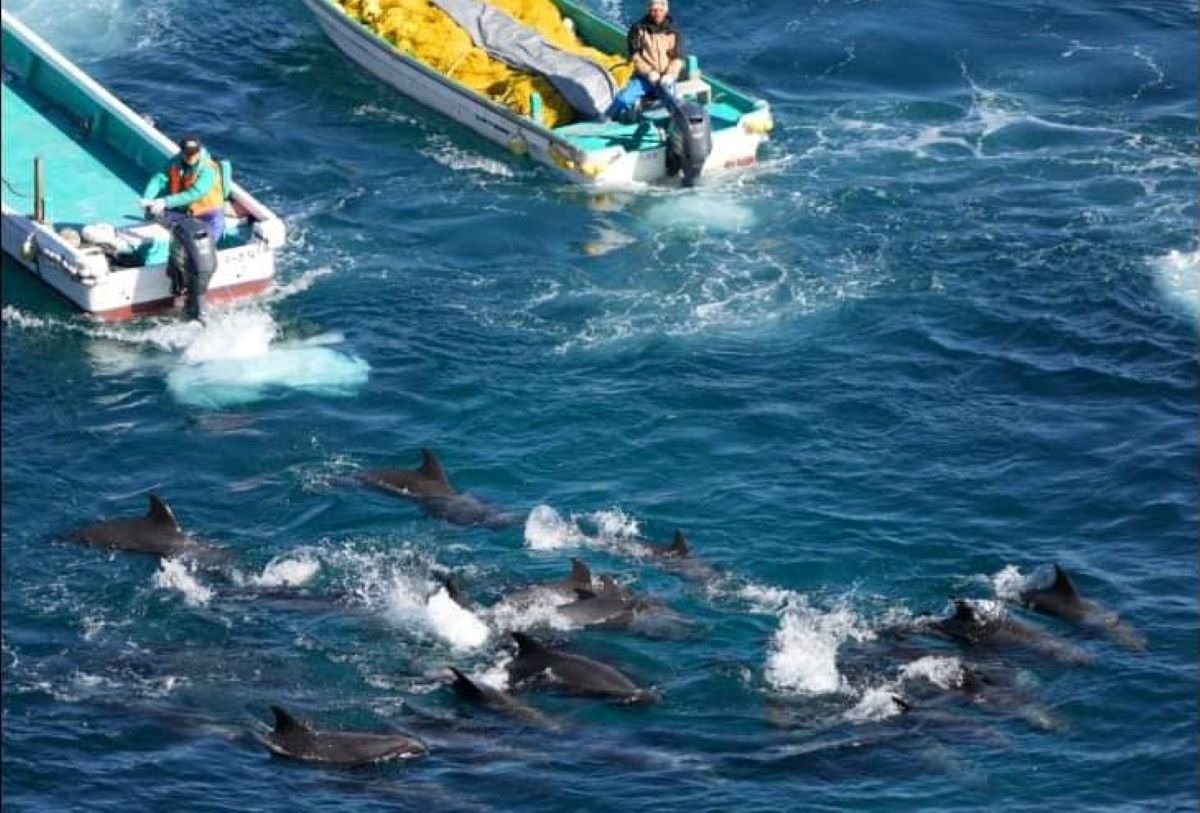Dolphins are being herded with a "curtain of noise" so they can be captured for meat and aquariums during the annual Taiji dolphin hunt in Japan.
The hunt takes place in the small village of Taiji, nicknamed "the Cove," in the Higashimuro District every year from September 1 to March 1. Hunters herd large numbers of dolphins close to the shore, where they are captured in nets. The dolphins are either slaughtered for meat or taken to marine aquariums.
Controversy over the hunting increased with the 2009 release of the Oscar-winning documentary The Cove, which detailed how the dolphins are pursued and killed in Taiji.
Ric O'Barry, a founder and director of the Dolphin Project, which has been campaigning against the hunting for years, appears in the film. He told Newsweek: "The traffic in captive 'show dolphins' is the economic underpinning of the barbaric dolphin hunt in Taiji, Japan. Everyone reading this can help abolish this anachronistic practice by simply stop buying tickets for dolphin shows."
Other conservation groups are outraged at the hunting and campaigning for it to stop.
Danny Groves, head of communications at Whale and Dolphin Conservation (WDC), a wildlife charity, told Newsweek: "The drive hunts in Japan are fundamentally cruel. Once a pod is spotted, fishermen bang on metal poles, creating an underwater curtain of noise, which confuses and disorientates the dolphins.
"They are then herded or driven together to shore. Some of them, usually juveniles and calves, may be allowed to return to the ocean, alone, frightened and stressed. Most are not so lucky and are slaughtered for meat, which few people eat," Groves said.

The Dolphin Project, working along with the Life Investigation Agency, is documenting this year's hunt and posting updates to its Facebook page. On Monday, the organization reported that 58 melon-headed whales—including claves—had been driven into the cove. A total of 21 were killed, and 37 were chased away. But since the hunt started in September 2022, many more have been killed.
The Dolphin Project also reported that the hunters killed an entire pod of 12 Risso's dolphins.
It said on Facebook: "Even though the Risso's dolphin can dive to 1,000 feet and holds its breath for over 30 minutes, the Taiji hunters have developed techniques to confuse and panic dolphins, causing them to stay on the surface to breathe faster. This year the Risso's have been a constant target of these hunters, making this the 11th time they slaughtered Risso's this season. 108 Risso's have been slaughtered so far this season."
The six-month dolphin hunt is authorized by Japan's Fisheries Agency, but many animal welfare groups say it is cruel and unnecessary and call for it to be banned. The agency, which regulates the hunt, sets an annual quota for certain species. The quota for the 2022/2023 season is 1,849.
Last year, the hunts in Taiji year resulted in the death or capture of over 550 whales and dolphins, WDC reported.
In 2017, a senior official of the local fisheries association, Yoshifumi Kai, told The Guardian that the hunt is necessary for local people's livelihoods.
Those taking part in the hunt say the practice helps to supply the demand for meat. In addition, the capture of dolphins for marine parks can earn hunters thousands.
"In recent years, the driving force behind these hunts seems to be the demand for live individuals to fuel the entertainment industry, both in Japan and overseas," Groves said. "There's more and more focus on capturing good-looking, healthy individuals, usually young females, to sell to theme parks.... A dead dolphin fetches a few hundred U.S. dollars, yet a live, trained dolphin could earn over $100,000."
He continued: "More and more information is surfacing about the high levels of pollution in dolphins and small whales and the human health implications associated with eating contaminated meat. So the link between these drive hunts and the captivity industry grows stronger, with million-dollar deals between Taiji fishermen and Chinese aquariums."
Their lives in captivity are miserable, according to Groves.
"Whales and dolphins are not meant to be kept in small tanks," he said. "Separated from their families, they cannot travel the huge distances they might each day in the wild and so suffer stress, swimming in small circles, living shorter lives performing unnatural tricks for food just to entertain us. And that is if they are lucky."
WDC has worked to expose the cruelty involved in the dolphin hunting. An independent analysis of the hunt found "disturbing levels of physical trauma and extreme cruelty that fall well below international standards for animal welfare."
Animal welfare groups believe the practice is cruel and also needs to be banned for the sake of the ecosystem.
"This practice remains all the more baffling when we are fighting against climate breakdown," Groves said. "A healthy planet needs a healthy ocean, and whales and dolphins help maintain a healthy ocean. Slaughtering them in such a brutal way and removing them from the ocean to put them in tanks makes no sense."
Do you have an animal or nature story to share with Newsweek? Do you have a question about the Taiji dolphin hunt? Let us know via nature@newsweek.com.
Update, 1/25/23, 9:25 a.m. ET: This story has been updated to include a comment from Ric O'Barry of the Dolphin Project.
Uncommon Knowledge
Newsweek is committed to challenging conventional wisdom and finding connections in the search for common ground.
Newsweek is committed to challenging conventional wisdom and finding connections in the search for common ground.
About the writer
Robyn White is a Newsweek Nature Reporter based in London, UK. Her focus is reporting on wildlife, science and the ... Read more
To read how Newsweek uses AI as a newsroom tool, Click here.








